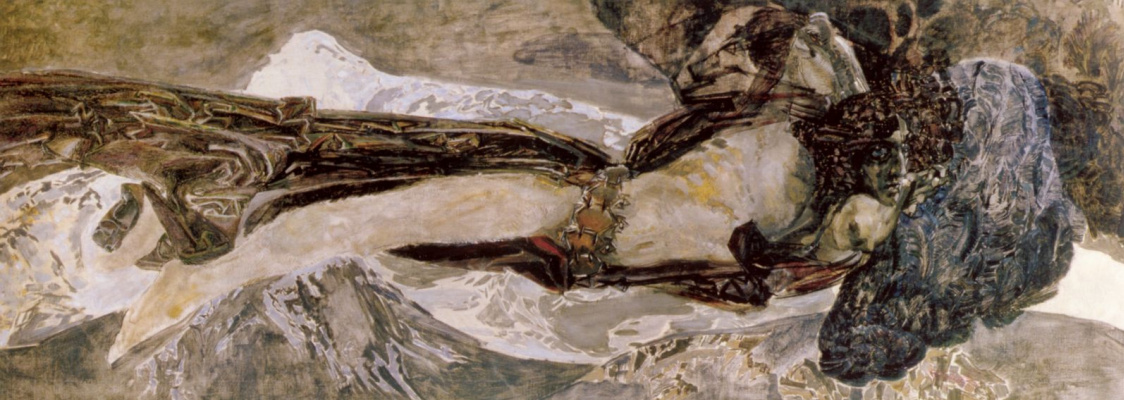log in
Enter site
Login to use Arthive functionality to the maximum
Flying Demon
Mikhail Vrubel • Painting, 1899, 138×430 cm
Description of the artwork «Flying Demon»
The theme of the Demon was one of the main themes, which Vrubel addressed again and again throughout his life. Being a man with a complex character, he was distinguished by a special devotion in painting of interior of Church, a painter noted in conversations with your loved ones an alienation which he experienced in relation to religious rites. Vrubel liked the stark monumentality of the temples, he believed that the religion of creative people is an art.
The design of the Vladimir Cathedral in Kiev, Vrubel made on Cyril's Church, were not taken — in images of saints too, clearly showed the earth, if not disturbing to the eye and embarrassing the soul of the images. Subsequently, they began to appear in the outline, which the artist then creates his famous Demons.
First the picture "Demon" by Mikhail Vrubel appeared in 1889, was a watercolor depicting a seated Demon. The artist will write dozens of sketches trying to catch the changeable image appeared in his mind during the study of Byzantine frescoes and mosaics. After receiving the offer to illustrate the works of Lermontov, which included the famous poem "Demon" by Vrubel with passion takes work.
To create an image of your character, he often listens to Opera, Rubinstein's "the Demon", a poem by Lermontov quotes by heart. As a result, all the known paintings of Vrubel's "seated Demon" and written with black watercolor illustration for the poem "Demon and Tamara". The criticism that befell Vrubel after the works of Lermontov, has led to the fact that the artist for ten long years I lost interest in this thread, although, according to him, he planned a tetralogy depicting the Demon in various manners.
In 1898 Vrubel returned to his character. He begins to write the painting, which depicts a Demon flying over the Caucasus mountains. On the background of snowy mountains is visible, the dark figure of the Demon, clothed in a tunic of brown. He looking forward on his face to guess the print of sorrow and deep thoughtfulness. Dark grey and brown tones with a narrow space left between heaven and earth, create a sense of anxiety and impending doom: the viewer seems to be the Demon flies in the face of his defeat, already anticipating it, but not in forces anything to change.
Picture of Vrubel's "Demon flying" was not destined to appear before the public: the artist not finishing the painting because of difficult family circumstances. By delaying it, he set about creating his latest masterpiece on the subject — "the Demon prostrate", which became the final chord of the Symphony.
The design of the Vladimir Cathedral in Kiev, Vrubel made on Cyril's Church, were not taken — in images of saints too, clearly showed the earth, if not disturbing to the eye and embarrassing the soul of the images. Subsequently, they began to appear in the outline, which the artist then creates his famous Demons.
First the picture "Demon" by Mikhail Vrubel appeared in 1889, was a watercolor depicting a seated Demon. The artist will write dozens of sketches trying to catch the changeable image appeared in his mind during the study of Byzantine frescoes and mosaics. After receiving the offer to illustrate the works of Lermontov, which included the famous poem "Demon" by Vrubel with passion takes work.
To create an image of your character, he often listens to Opera, Rubinstein's "the Demon", a poem by Lermontov quotes by heart. As a result, all the known paintings of Vrubel's "seated Demon" and written with black watercolor illustration for the poem "Demon and Tamara". The criticism that befell Vrubel after the works of Lermontov, has led to the fact that the artist for ten long years I lost interest in this thread, although, according to him, he planned a tetralogy depicting the Demon in various manners.
In 1898 Vrubel returned to his character. He begins to write the painting, which depicts a Demon flying over the Caucasus mountains. On the background of snowy mountains is visible, the dark figure of the Demon, clothed in a tunic of brown. He looking forward on his face to guess the print of sorrow and deep thoughtfulness. Dark grey and brown tones with a narrow space left between heaven and earth, create a sense of anxiety and impending doom: the viewer seems to be the Demon flies in the face of his defeat, already anticipating it, but not in forces anything to change.
Picture of Vrubel's "Demon flying" was not destined to appear before the public: the artist not finishing the painting because of difficult family circumstances. By delaying it, he set about creating his latest masterpiece on the subject — "the Demon prostrate", which became the final chord of the Symphony.


